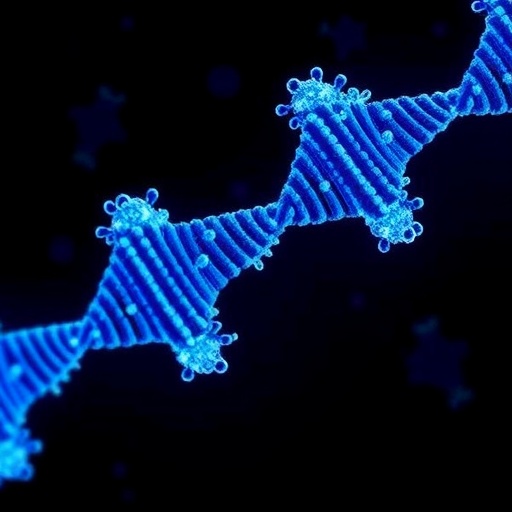In a groundbreaking study published in BMC Neuroscience, researchers have explored the potential of long-term neprilysin gene transfer as a therapeutic strategy in Alzheimer’s disease. The focus of this research lies in the transgenic mouse model that expresses human amyloid precursor protein (APP), which is pivotal for understanding the mechanisms behind amyloid-beta (Abeta) accumulation in the brain, a hallmark of Alzheimer’s pathology. The study, led by Spencer, Marr, and Rockenstein, demonstrates significant findings regarding the reduction of intracellular Abeta levels and associated behavioral improvements.
Neprilysin, an enzyme known for its role in degrading neurotoxic peptides, has gained attention as a potential therapeutic target. This study aims to assess whether enhancing neprilysin activity through gene transfer can lead to the substantial clearance of Abeta plaques deposited in the brains of APP transgenic mice. Previous studies have indicated that diminished neprilysin levels correlate with increased Abeta accumulation, suggesting that strategies aimed at gene transfer might be a viable approach to alleviate symptoms associated with Alzheimer’s disease.
The research involved administering a recombinant adeno-associated virus (AAV) carrying the neprilysin gene directly into the brains of APP transgenic mice. This method ensures that the gene is effectively delivered to neuronal cells, allowing for sustained production of neprilysin over time. This innovative approach highlights the power of gene therapy in producing lasting effects in the nervous system and opens new avenues for treating neurodegenerative diseases.
Following the gene transfer, the researchers meticulously measured both intracellular and extracellular levels of Abeta, utilizing advanced neuroimaging techniques alongside biochemical assays. The results indicated a remarkable decrease in intracellular Abeta, specifically within neurons, demonstrating that enhanced neprilysin production can lead to effective clearance of neurotoxic aggregates. These findings have profound implications for developing therapies aimed at preventing or slowing down the progression of Alzheimer’s disease.
Behavioral assessments also revealed encouraging results, as treated mice exhibited improved cognitive functions compared to their untreated counterparts. Standardized tests measuring memory, learning, and overall behavior indicated significant enhancements. This suggests that the reduction of toxic Abeta levels directly impacts cognitive performance, reinforcing the potential of neprilysin gene therapy in altering the disease trajectory in Alzheimer’s patients.
Moreover, the study delves deeper into the molecular mechanisms by which neprilysin influences Abeta metabolism. Researchers found that increased neprilysin activity not only enhances the degradation of Abeta but may also promote a shift in the dynamics of protein aggregation. It appears that neprilysin might facilitate the clearance of Abeta precursors, thereby preventing the formation of larger, toxic aggregates. This multifaceted approach to tackling Alzheimer’s underscores an innovative paradigm in neuropharmacology.
The investigators further emphasize the necessity of long-term studies to fully comprehend the safety and efficaciousness of neprilysin gene transfer in a clinical context. While initial results are promising, the potential for adverse effects due to prolonged enzyme expression must be thoroughly assessed. There is also a need to examine whether the improvements noted in animal models can indeed translate into human subjects who suffer from the complex manifestations of Alzheimer’s disease.
Additionally, the findings advocate for a reconsideration of therapeutic strategies focused purely on symptomatic treatment. By concentrating on the underlying pathophysiology of the disease through genetic modulation, there is potential for clinicians to shift from traditional symptomatic relief to actually modifying disease progression.
The research team acknowledges the collaborative efforts of various institutions and funding bodies, underscoring the importance of interdisciplinary partnerships in advancing scientific research. They also point towards the importance of public and private investment in developing such innovative approaches to difficult diseases that continue to impose immense burdens on individuals and healthcare systems worldwide.
Ethical considerations surrounding gene therapy are also raised in the study, reiterating the cautious approach required when developing novel treatments. As the technology evolves, the ethical implications of genetic manipulation, specifically in human subjects, must not be overlooked. This research paves the way for discussions about the responsible translation of genetic therapies from laboratory settings to clinical applications.
Closing on a hopeful note, the authors project that if these findings hold true in clinical trials, neprilysin gene therapy could become a cornerstone in the fight against Alzheimer’s disease. The prospect of harnessing the body’s natural mechanisms to combat neurodegeneration could revolutionize treatments and significantly improve the quality of life for millions of individuals battling this devastating disease.
As ongoing studies expand on their research findings, the scientific community remains optimistic that advancements in gene therapy, particularly those involving neprilysin, will yield transformative results in neurological disorders. The integration of cutting-edge genetic technologies with deep biochemical insights marks a promising future in the quest for effective Alzheimer’s treatment options.
In conclusion, this study is an essential step in uncovering the potential of gene therapy to reverse the tide of Alzheimer’s disease, emphasizing the importance of reducing intracellular Abeta levels. With future research, there is hope that novel treatments will emerge that provide both improved cognitive function and a reduction in clinical symptoms, ultimately transforming the lives of those affected by this relentless condition.
Subject of Research: Neprilysin gene transfer and its effects on intracellular Abeta levels and behavior in APP transgenic mice.
Article Title: Long-term neprilysin gene transfer is associated with reduced levels of intracellular Abeta and behavioral improvement in APP transgenic mice.
Article References:
Spencer, B., Marr, R.A., Rockenstein, E. et al. Long-term neprilysin gene transfer is associated with reduced levels of intracellular Abeta and behavioral improvement in APP transgenic mice.
BMC Neurosci 26, 60 (2025). https://doi.org/10.1186/s12868-025-00980-6
Image Credits: AI Generated
DOI: 10.1186/s12868-025-00980-6
Keywords: Neprilysin, gene therapy, Alzheimer’s disease, intracellular Abeta, APP transgenic mice, neurodegenerative diseases, cognitive function, biochemical mechanisms.
Tags: Alzheimer’s pathology researchAlzheimer’s disease treatment strategiesamyloid precursor protein studiesamyloid-beta clearancebehavioral improvements in Alzheimer’sgene therapy for neurodegenerative diseasesneprilysin enzyme roleneprilysin gene transferneurodegeneration and gene transferneurotoxic peptide degradationrecombinant adeno-associated virus therapytransgenic mouse model research





